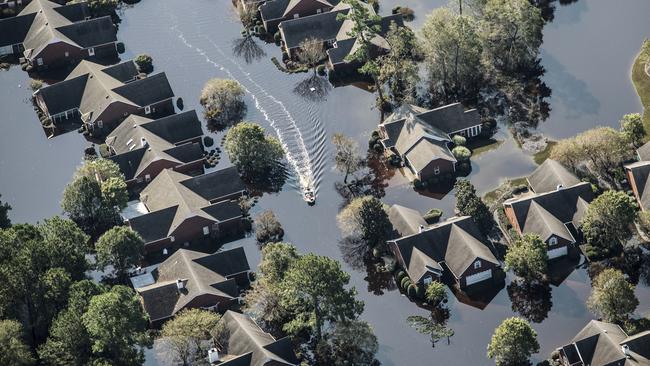Report’s sensational claim of ‘climate breakdown’ is catchy but untrue

How much did climate change cost last year? One major charity says the answer is $US85 billion ($118bn). That claim was repeated by many newspapers — just as it was designed to — yet it is nonsense.
In the final week of last year, large British-based charity Christian Aid released a report, Counting the Cost: A Year of Climate Breakdown, documenting the “huge costs of climate impacts”. The media shared the dramatic findings. But the charity, which receives money from the British and US governments and the European Commission and raised more than £100 million in 2017-18, is scaremongering.
Christian Aid’s report only lists the costs of 10 weather events and adds alarming commentary. It hasn’t examined the science on the links between these events and climate change.
It is akin to adding up the cost of high street bankruptcies last year and declaring that to be “the cost of Brexit” without working out how many would have gone bankrupt anyway. (Or, for Brexit supporters, adding the incomes of all new firms and claiming this to be the “Brexit windfall”.)
By far the most expensive disasters documented in the report are hurricanes Florence and Michael, which struck the US. However, it’s wrong to suggest climate change is increasing the number of hurricanes.
The UN panel of climate scientists found in its latest global report that hurricanes (or tropical cyclones) have not increased during the past century.
In the US, the trend of all land-falling hurricanes has been declining since 1900. The costs of hurricanes are increasing, but not because of climate change.
Across the past century, the US population in coastal areas climbed 50-fold.
Homes are bigger and have many more expensive possessions. Where Florence made landfall, the number of homes increased by 1325 per cent between the 1940s and today.
Adjusted for population and wealth, a careful study finds that US hurricane costs between 1900 and 2017 did not increase, and actually show “a very high degree of consistency”.
Christian Aid claims that “catastrophic warming” is going to make last year’s hurricanes and other weather events seem insignificant. It has the science wrong.
A major study in Nature shows hurricane damage costs about 0.04 per cent of global gross domestic product. Rising prosperity creates more resilience, so this cost is expected to drop to 0.01 per cent of GDP by 2100. Uncurbed global warming would make storms fewer but stronger. Factoring this in, according to the study, means the cost will end up about 0.02 per cent of GDP. Even with what Christian Aid labels “climate breakdown”, and even with no efforts to stop temperatures rising, hurricanes will deprive us of a smaller part of our wealth in 2100 than today.
While the bulk of Christian Aid’s report focuses on weather events in well-off countries — the US, Australia, Europe and Japan — the charity claims to be most concerned by the effect of climate change on “the poorest and most vulnerable”. This is an odd claim because the biggest developing nation weather disaster that the charity includes in its report wasn’t actually caused by climate change.
“The Kerala floods are an example of one of the consequences of continued greenhouse gas emissions,” says Christian Aid. In reality, a new peer-reviewed analysis shows there has been no increase in precipitation in the Indian state of Kerala in six decades and finds it unlikely last year’s flood was caused by global warming.
If the charity wanted to help prevent further flooding in Kerala, it would focus on changing land use and limiting settlement on flood plains. But that doesn’t generate social media attention and headlines or sell T-shirts in the same way as tapping into concerns about “climate breakdown”.
Christian Aid is disregarding both the evidence — and what the world’s poorest say they want.
The UN’s vast global survey reveals that for people from the poorest countries, climate change comes dead last in their concerns, well after education, health, jobs, transparent government and food.
Christian Aid’s policy prescription is as ungrounded as its accounting of costs: it says politicians need to make bigger emission cut pledges. More empty words won’t solve climate change. We need less rhetoric and a dramatic increase in green energy research and development.
A credulous media repeated Christian Aid’s alarmist “cost” of climate change with little or no scrutiny.
This is dangerous because it heightens the risk that we fail to tackle the real issue of climate change effectively. And it disguises the reality that we need to look beyond the concerns of well-resourced charities and instead focus on the help that the world’s poor are asking for.
Bjorn Lomborg, a visiting professor at the Copenhagen Business School, is director of the Copenhagen Consensus Centre. His books include The Skeptical +Environmentalist.



To join the conversation, please log in. Don't have an account? Register
Join the conversation, you are commenting as Logout